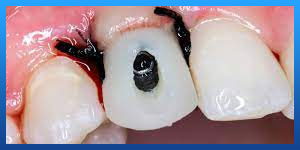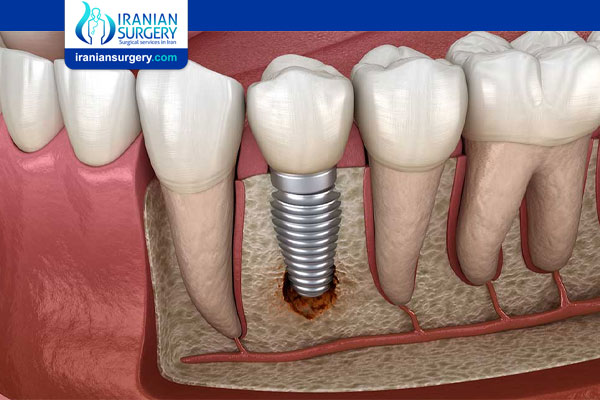Dental Implant Failure
Bad dental implant
What is the failure rate of dental implants?
The failure rate of dental implants is low. Studies suggest that less than 5% of dental implants fail within 10 years of the procedure being carried out. One of the reasons why the failure rate is low is because dentists should only recommend this type of treatment if the patient meets all of the criteria to have a good chance of success. If your dental implants fail and you find out that you were never a good candidate for this procedure in the first place, this could be considered dental negligence and you may be able to claim compensation.
Can a failed dental implant be replaced?
If your dental implant has failed, then in some circumstances, you may be able to have it replaced. This will depend on the reasons for the failure. It may be the case that you are no longer a good candidate for dental implants, so an alternative form of restorative dental procedure might be recommended, such as a bridge.

Speak to your dentist about the options available to see if your implant can be replaced, or whether another kind of treatment is now recommended.
Dental Implant Crown Problems
If your tooth implant is moving, first and foremost, don’t freak out. More than likely the implant tooth can be fixed. There can be many issues that cause an implant tooth to loosen and we will review all of them. The key is to be careful chewing on the loose tooth as to not cause more damage.
Read more about : German dental implant
Read more about : Dental implants cost in Iran
The Screw Can Loosen
No, this is NOT your implant. There is a small screw that connects the crown to the actual implant. If the screw is loose, there is a simple fix. The crown will need to have a hole drilled in it for access to the screw. Some implant crowns are actually originally designed with a screw hole and are covered with filling material. The majority of the time the screw can be tightened and it is a simple 10-minute fix.
If you are in the middle of dental implant treatment your healing cap may have fallen out. If your dental implant healing cap fell out then you should get it put back in immediately to prevent the gums from growing over the implant.
Metal Can Fracture Under Biting Forces
Sometimes a part of the implant, the abutment or a part of the crown has broken. Even though dental implants are made of metal they can break under the large biting forces. It is extremely rare but it can happen. If either the crown or the abutment (part that attaches the crown to the actual root implant) is broken then you are in luck. This is simple fix, however a bit costly. Your dental implant is still good and the abutment and crown can simply be remade and a new one installed within a few weeks.
If your dental implant fractured then, unfortunately, it cannot be fixed. A new tooth implant can be installed after removing the broken one.
Can Dental Implants Get Infected Years Later?
Most complications from dental implants come from infections. A common implant infection is peri-implantitis. This type of infection is a form of periodontal (gum) disease that if left untreated can lead to inflammation, bone loss and implant failure. Implant infections are caused by bacteria and can happen immediately after implantation or months or even years later. Furthermore, if your dentist did not use titanium dental implants, an infection can grow due to the poor quality of the implant material used.
Dental Implant Failure Symptoms
Dental implant failure can occur during the first stages after the procedure, or they can turn out to be a long-term failure.
What are the signs of dental implant failure? We listed the signs you should watch out for after getting dental implants.
Read more about : Bone Grafting Surgery
Severe Pain and Discomfort
You may experience some pain during the healing process. However, pain can be a sign of dental implant failure.
How can you tell the difference between the two types of pain?
During the healing process, you will experience the pain for the first few days. The pain is not as intense, and it can be controlled using some painkillers prescribed by the doctor.
In case of a dental implant failure, you will experience excruciating pain and discomfort that comes in the form of throbbing waves. This pain occurs long after the procedure.
If you experience such, it’s advisable you visit your dentist for a checkup before it’s too late.
Gum Recession around the Implant
Two major reasons that cause gum recession around the implant include, poorly positioned implants and inadequate gum and bone tissue to hold the implant.
How can you tell you have gum recession around your implant?
Well, the first sign will be an abnormally long implant crown. This is followed by painful inflammation around the implant.
To prevent this, your surgeon should place the implant in the correct position. Angulation is also a crucial part of this procedure, which should be done using digital dental implant diagnostics and planning.
Besides, ensure that you have healthy gums and bone tissue by maintaining a healthy diet and oral hygiene.
Difficulty While Chewing and Biting
Are you’re having a hard time chewing or biting food? This can be a sign of dental implant failure.
At no given time should you experience any abnormality while eating or talking or biting down substances. Implants are made to function and feel like natural teeth.
Any pain associated with a dental implant is not a good sign. It’s just similar to experiencing pain while chewing with a tooth cavity.
Shifting and Loose Implant
If your dental implant is done correctly, you wouldn’t even be conscious of having an implant. It should never, at any given time, feel like a foreign object in your mouth.
If the implant is not properly seated on your gums, you will feel it wobble when you talk, eat, or touch it. This is the easiest sign to spot an implant failure.
In case you discover a shifting and loose dental implant, set up a consultation with your dentist immediately.
If the loose implant is left unattended, it could interfere with the look of your smile or cause severe damage to your gums and jaw bone.
Swollen Gums
Minor swelling is normal after the procedure. However, this is expected to disappear within a few days. If it persists and even gets inflamed, it’s a cause for concern.
If your gums appear extremely swollen and red, it’s a sign of an infection. If untreated, this infection can spread to the rest of your mouth, and in severe cases, it can spread to your blood. This can create a dangerous health condition. It’s tough to treat an infection that has escalated, not to mention the intense pain that you will experience.
The best thing to do if the swelling persists past the healing stage is to consult your dentist and have it treated as early as possible.
Implant Micro-Movements
Sometimes your surgeon can perform a tooth replacement immediately after implantation. This procedure requires less healing time as compared to doing the implantation and waiting until it integrates with your jaw bone before placing the tooth.
At first, you will enjoy having fewer checkup visits. However, if your jaw bone is not strong enough, the procedure can put excess stress on it, which can cause implant failure. You can detect this by having an x-ray which will indicate micro-movements of the implant.
Sudden Allergic Reactions
Dental implants are made of titanium alloy, which causes allergic reactions to some people. Some signs of allergic reactions include loss of taste, swelling around the gums, and a tingling sensation.
Sudden allergic reactions are a sign of dental implant failure because they indicate that your body is rejecting the implant.
- Teeth Grinding
This is a long-term dental implant failure. It happens due to several reasons, such as stress, missing teeth, or misaligned teeth. Some people also experience teeth grinding while sleeping.
To begin with, you will feel pressure where your implant is followed by persistent pain in your gum in your jaw bone.
Teeth grinding makes it hard for the implant to integrate with your jaw bone due to excessive pressure on your teeth caused by the dental implant procedure.
If you have episodes of teeth grinding, it may be a sign of dental implant failure. Therefore, you need to see your dentist check whether the implant is correctly aligned with your jaw bone.
Source:
https://www.smilesaversdentistry.com/signs-of-dental-implant-failure
https://rockvilledentalarts.com/what-to-do-if-your-implant-crown-is-loose/


